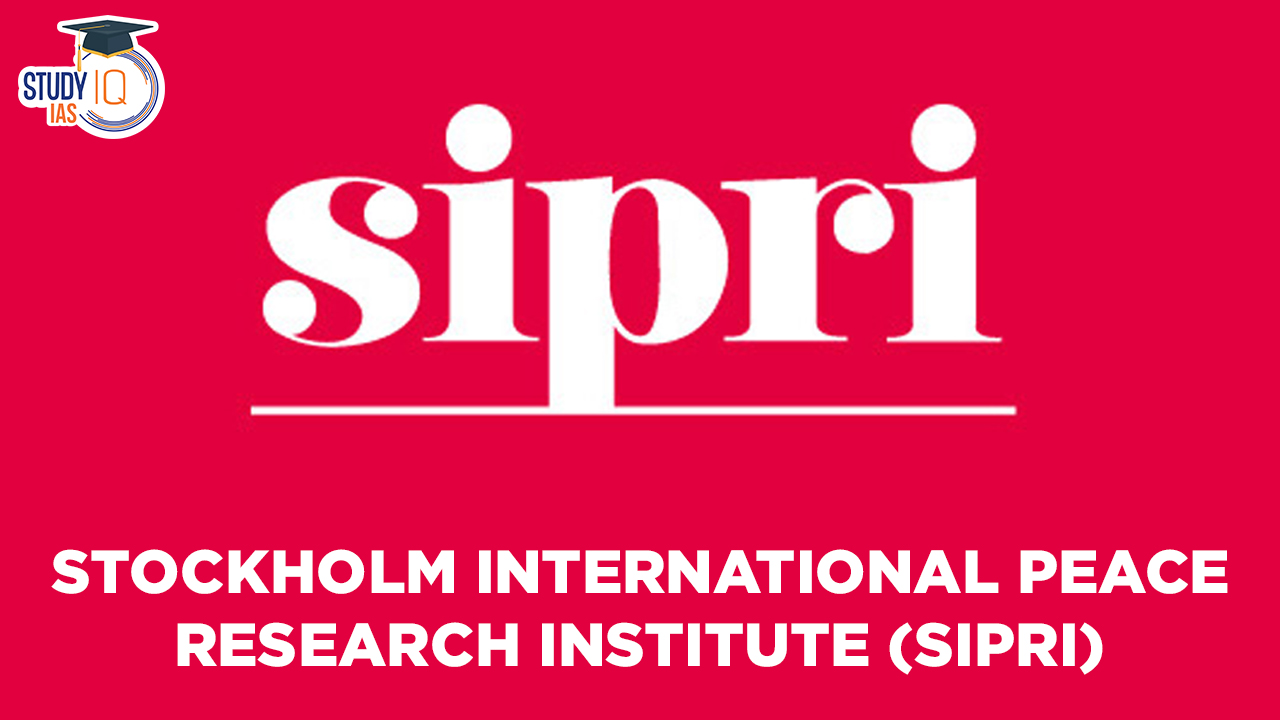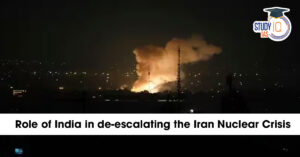Table of Contents
The Stockholm International Peace Research Institute, often abbreviated as SIPRI, is an independent international research organization based in Stockholm, Sweden. SIPRI’s primary focus is on research and analysis related to issues of peace, conflict, and security, with a particular emphasis on arms control, disarmament, and the global arms trade. SIPRI was established in 1966 and has since become a leading authority on global security issues.
Stockholm International Peace Research Institute (SIPRI) History
In 1964, Sweden’s Prime Minister, Tage Erlander, proposed the creation of a peace research institute to mark the nation’s 150 years of uninterrupted peace. A Swedish Royal Commission, led by Ambassador Alva Myrdal, recommended the establishment of the Stockholm International Peace Research Institute (SIPRI) in its 1966 report. SIPRI’s mission was to contribute to the understanding of conditions for stable peace and conflict resolution, focusing on arms control and reduction. It conducts applied research and maintains a constant exchange with theoretical research, emphasizing competence, professionalism, and the collection of precise, impartial data on weapon developments, arms transfers, military spending, and disarmament. Founded as an independent foundation on July 1, 1966, SIPRI remains dedicated to global peace and security research.
We’re now on WhatsApp. Click to Join
Headquarters of SIPRI
The Stockholm International Peace Research Institute (SIPRI) is based in Stockholm, Sweden. SIPRI was established in 1966 and is dedicated to research into conflict, armaments, arms control, and disarmament.
SIPRI also has a presence in Beijing. It provides data, analysis, and recommendations to policymakers, researchers, media, and the interested public.
SIPRI’s staff and Governing Board are international. The Institute also hosts guest researchers and interns who work on issues related to the SIPRI research programmes.
Where is SIPRI located in India?
SIPRI, the Stockholm International Peace Research Institute, headquartered in Stockholm, Sweden, specializes in offering insights, data, and policy recommendations regarding topics such as armed conflicts, military spending, arms trade, disarmament, and arms control. Shivpuri, a city and a municipality in Madhya Pradesh, India, formerly known as Sipri.
Additionally, SIPRI is involved in the construction of a 500-megawatt-electric (MW(e)) prototype fast breeder reactor (PFBR) within the Indira Gandhi Centre for Atomic Research (IGCAR) complex in Kalpakkam, Tamil Nadu. This reactor project aims to enhance India’s plutonium production capacity, potentially for military purposes.
Stockholm International Peace Research Institute (SIPRI) Objectives
- SIPRI (Stockholm International Peace Research Institute) is dedicated to promoting global peace and security through research and analysis.
- SIPRI conducts research on various aspects of peace and security, including the causes of armed conflicts, strategies for conflict resolution, arms control, and disarmament.
- The institute monitors and reports on global military spending, arms production, transfers, and acquisitions, fostering transparency and accountability.
- SIPRI provides impartial and factual information to inform policymakers, researchers, and the public about security issues.
- SIPRI facilitates dialogue and collaboration among experts, policymakers, and stakeholders through conferences and workshops.
- The institute contributes to international diplomacy by supporting diplomatic efforts to address global security challenges.
- SIPRI’s overarching mission is to contribute to the conditions necessary for peaceful international relations and to promote informed decision-making for a more peaceful world.
Stockholm International Peace Research Institute (SIPRI) Role
The Stockholm International Peace Research Institute (SIPRI) plays a significant role in the field of global peace, security, and international relations. Its key roles include:
- Research and Analysis: SIPRI conducts in-depth research and analysis on a wide range of global security issues, contributing valuable insights into the causes of conflicts, strategies for conflict resolution, arms control, disarmament, and related topics.
- Data Collection and Dissemination: SIPRI collects and disseminates accurate and up-to-date data on military spending, arms production, arms transfers, and other relevant information, promoting transparency and accountability in the international security landscape.
- Policy Recommendations: SIPRI provides policy recommendations to governments, international organizations, and other stakeholders, helping inform decision-makers about effective strategies for conflict prevention, arms control, and peacebuilding.
- Promoting Peace and Stability: SIPRI works to identify opportunities for conflict prevention and resolution, fostering peace and stability on a global scale by addressing the root causes of conflicts.
- Supporting Diplomacy: SIPRI supports international diplomatic efforts by offering research and expertise, assisting governments and organizations in crafting effective policies and solutions to address security challenges.
- Information Resource: SIPRI serves as an invaluable resource for policymakers, researchers, and the general public, providing impartial and factual information on security matters.
- Dialogue and Collaboration: The institute hosts conferences, workshops, and discussions, bringing together experts, policymakers, and stakeholders from around the world to facilitate dialogue and collaboration on peace and security issues.
What is SIPRI report 2023?
The SIPRI Yearbook 2023 is an annual assessment of international security, weapons, and technology. It includes data on:
Military expenditure, Arms production, Arms trade, Armed conflicts, Nuclear forces, and Multilateral peace operations.
The SIPRI Yearbook 2023 also includes an analysis of arms control, peace, and international security.
Some key findings from the SIPRI Yearbook 2023 include:
- The number of operational nuclear weapons is increasing.
- Global military expenditure reached $2.1 trillion in 2022, a 0.7% increase from 2021.
- The total global inventory of warheads is estimated at 12,512, with approximately 9,576 warheads held in military stockpiles for potential use.
- The SIPRI Yearbook 2023 is published by Oxford University Press.
SIPRI’s Reports and Publications
| Report/Publication | Description |
| SIPRI Yearbook | Comprehensive annual overview of arms control, disarmament, military expenditure, and security developments. |
| Arms Transfers Database | Extensive data on international arms transfers, including major conventional weapons sales and transfers. |
| Military Expenditure Database | Tracks global military spending, providing insights into defense budgets and trends. |
| Nuclear Weapons Database | Research and data on nuclear weapons arsenals, disarmament efforts, and non-proliferation initiatives. |
| Conflict, Peace, and Security Reports | Focus on conflict prevention, peacebuilding, and conflict resolution, with analysis of root causes of armed conflicts. |
| Arms Control and Disarmament Reports | Covers international arms control agreements, disarmament efforts, and non-proliferation initiatives. |
| Regional and Thematic Reports | Addresses specific regional security issues and thematic topics like cybersecurity and emerging military technologies. |
Stockholm International Peace Research Institute (SIPRI) UPSC
The Stockholm International Peace Research Institute (SIPRI) is an independent research organization in Sweden, dedicated to promoting global peace and security. Established in 1966, it conducts in-depth research and analysis on issues such as armed conflicts, arms control, and disarmament. SIPRI collects and disseminates data on military spending and arms production, fostering transparency. It provides policy recommendations to governments and organizations, supports diplomacy efforts, and offers valuable insights on conflict prevention and resolution. The SIPRI Yearbook 2023 is a key publication, highlighting global security trends, including a rise in operational nuclear weapons and a 0.7% increase in military expenditure to $2.1 trillion in 2022.


 Iran Nuclear Crisis and India’s Role f...
Iran Nuclear Crisis and India’s Role f...
 H1B Visa Program, Beneficiaries, Eligibi...
H1B Visa Program, Beneficiaries, Eligibi...
 United Nations General Assembly (UNGA), ...
United Nations General Assembly (UNGA), ...

























